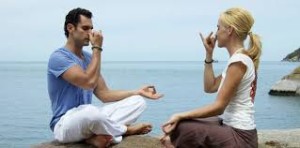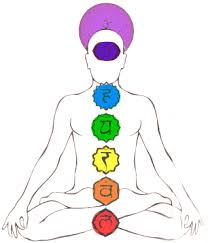Meditation How and Why?
 Whether your faith is Christian, Jewish, Muslim, Hindu, Buddhist, Taoist, or atheist, it doesn’t matter, all humans can benefit from meditation. Meditation at its core is the simplest and most natural human activity. It is taking time to connect with the source of who we are.
Whether your faith is Christian, Jewish, Muslim, Hindu, Buddhist, Taoist, or atheist, it doesn’t matter, all humans can benefit from meditation. Meditation at its core is the simplest and most natural human activity. It is taking time to connect with the source of who we are.
When studying meditation techniques from various traditions, the most striking thing about them is that they all say the same thing. The wording may vary due to cultural and personality differences, but the message is identical.
Here is a wonderful teaching from Ramana Maharshi, the great Hindu sage from the last century:
“Retreat ever within thine own self: seek the source whence the restless mind spins out an unceasing web of thoughts; brush aside the springing thoughts; concentrate at the root of thought; and take repose in that stillness and quietude. So much is thy effort, and what next is one for experience and inner realization, and does not admit of exposition in words.”
“The mind is by nature restless. Begin liberating it from its restlessness; give it peace; make it free from distractions; train it to look inward; make this a habit. This is done by ignoring the external world and removing the obstacles to peace of mind.” p. 27 from Talks
Who is the Self that Ramana Refers to?
The Self—is yourself, the constant, true eternal presence that you relate to in every moment of your life. It was with you prior to your birth, and remains with you throughout your life as your Self—and at death it continues to be with you. According to the Hindus there is no death for the Self—for the mortal body yes—but not for the spiritual Self.
Meditation is the practice of focusing our attention on the present moment. The past has fled like a dream, and the future is imagination. Even the present moment is gone in a fraction of a second. Hindus believe that the Self is the unchanging eternal reality underlying what we perceives as the passage of time. Through all the transformations we go through in our life from infancy through old age, the Self, or our sense of awareness, never leaves us..
In meditation we concentrates the attention on the sense of ourselves as “I” and holds to that “I” feeling. In deep meditation concepts do not arise—the concept of religion, God, my family, my country—does not arise. This is a universal state where there are no religious distinctions. That is why all religious traditions describe it in the same way—One Reality devoid of distinctions.
Applying Meditation to Your Self
When centered in the Self in the state of meditation—work proceeds automatically. We know what we need to do without needing to think about it, just as we know how to walk without needing to mentally break down the steps. So it is with all actions.
When you work in the moment with your mantra proceeding quietly inside—and your focus internalized—you experience happiness in the process of work. Your work is not ego driven—meaning you are putting your Self first—not the work first. Consequently you are working in a calm and relaxed manner—and resting at appropriate intervals.
Some Hints on How to Meditate
For years I believed that it was important to sit up straight in a chair, or on the floor with your legs crossed, eyes either closed, lowered or partially open, and that the position was important to success and making progress in meditation. Now I am more relaxed about it. I realize that the Self, which is the focus I use in meditation, is always with me. You could be standing on your head, lying down in bed, walking the dog in the park, washing the dishes or driving. The focus point of the Self never leaves you.
The important thing is concentration on your focus point. What gets in the way of this is distractions, so minimizing distractions, and making a conscious decision to do so will be a huge help in your meditation practice.
Use a timer: Make an appointment with your Self and stick it. There are so many demands on our time during the course of the day, so if you do not make an appointment with the Self and honor it, as though you are making an appointment with the most important being on Earth, which indeed you are doing, you will very easily give this time away.
Develop a Relationship with the Self. You can call it God, your higher power, Buddha, Jesus, Allah, Wankan Tanka, or any other name you choose, but make this an intimate relationship. Talk to this inner being, seek guidance, assistance, wisdom, help, and offer faith, love, devotion and surrender for your part. Make this a Spiritual Contract. This can take the form of inner prayer, if this resonates with you.
Helpful Meditation Tools
Mantra: Far and above everything the tool that has been most helpful to me is Mantra, “Reciting the Buddha Name,” in the Pure Land tradition; reciting the rosary in the Christian faith; saying the Shema for Jewish people; the Gayatri mantra for Hindus. and so forth. Here is a link to some Muslim mantras: http://www.shabarmantraonline.com/muslim-mantra/
I have used different mantras over the years; all religions have mantras that you may resonate with, or you can ask your spiritual guide to give you a mantra. The mantra is a centering device; it is an internalizing device; and a concentration vehicle. It is something you keep with you at all times, and is as close to you as your own mouth. It is a friend that you can always turn to for clarity, security, confidence. As you gain practice in chanting your mantra silently, it will continue on automatically during sleep and in the spaces between your activities. I love it when my mantra proceeds automatically. because I feel very centered at those times.
Breath: Watching the Breath and Pranayama practices is a meditation tool, which some people find very beneficial as a focus point. Here is one technique to do this: inhale to the count of five, hold your breath to the count of five, and exhale to the count of five. Alternate nostril breathing is another pranayama device.
Mudra: Use of Mudras or Hand Gestures is another tool, which I have written about in other articles. This method is helpful if the mind is extremely restless, and you need additional focus points, other than mantra and breath to rein in the mind. You can watch a video of me doing mudras on my website. Here is the link: https://homeopathyforhealth.net/2011/06/29/mudras-for-meditation/
Mala: Use of Malas or Beads. This is a wonderful meditation tool as well, and is used in the form of Rosary Beads by Christians, Malas by Hindus and Worry Beads by Muslims. In all faiths they serve the same purpose of providing the mind with a focus point. They are usually used in conjunction with a mantra, so you move one bead after the recitation of each mantra, and this further helps ground the concentration of the mind.
Use of Fingers in Lieu of Beads: Fingers and finger joints can also be used to help focus the mind during meditation on the mantra or breath.
Meditation on Objects Outside of the Self: Religious objects such as Mandalas, Crosses, Icons and Religious Symbols as objects of meditation can be very helpful. Generally their purpose is to give the mind an external focus point to hold in order to develop the ability to concentrate, and bring the mind to a one-pointed focus. The goal, however, ultimately, is for the seeker to find the focus point within himself. His or Her sense of herself as “I” becomes the focus point.
Meditation on Body Parts: Body parts are very handy meditation focal points. Some I have used over the years, are the blackness behind my eyes when I close them; the point between my eyes, known as the third eye; the heart; and the top of the head, or Crown Chakra. Again, these points are useful in helping you develop your powers of concentration, and lead to the ultimate focus point, which is the Self itself.
Calming the Mind: Often it is difficult to calm the mind when you first begin to meditate. When this happens, my recommendation is to let the mind fire off, and run through what it needs to cover. Eventually it will quiet down and you can begin to concentrate on medtation on the Self without forcing it. There might be things you need to remember to do, or the answer to a problem you have been working on suddenly becomes clear to you. This is one of the benefits of meditation, it helps you organize your mind. Sometimes I refer to this as mental housecleaning. Just as you need to wash the dishes and cleanse your body daily, the mind also needs attending to. When you have gone through this process the mental restlessness quiets down and introspection can begin.
Meditation As the Experience of Bliss: In meditation we endeavor to be in the thought-free state. Ramana Maharshi calls this your natural state. When you are in meditation you do not say this is bliss. It is only when you are out of meditation and thoughts resume that you realize how peaceful it feels to be in the stillness. Then you long to get back into the meditative state, which you feel was blissful.
My Meditation Practice
Meditation is a practice, just like playing the violin or the piano or learning a language. It has to be practiced in order for you to get good at. The better you get at it the more you enjoy doing it, and the greater the rewards.
I endeavor to practice three times a day: morning, after lunch, after work. The morning meditation prepares me for the day, the meditation after lunch reinvigorates me and renews my energy for the second half of the work day. The evening meditation clears me out from the days events, and washes my soul, and gives me rest and peace.
I invite you to take good care of yourself and make appointments with your Self that you commit to for self regeneration, self connection and spiritual renewal.
In Conclusion
Meditation is a practice endorsed by all religious faiths and many health practitioners to help people gain peace of mind, connection to the divine, equanimity and happiness. It is a practice that improves with practice. Its benefits are the spiritual qualities of happiness, gratitude, faith, oneness with all beings, compassion and love.
Other Meditation Benefits Are:
1) Stress reduction and relaxation.
2) Achieving inner peace and tranquility.
3) Connection with one’s inner core or essence.
4) Clarifying and purifying the mind.
5) Improving mental functioning.
6) Overcoming the fear of death.
7) Attaining the higher purposes of our human existence.
8) Rerouting the Source of our actions from the Ego to the Self, the spiritual core of who we are.
9) Access to Intuition
10) Equanimity
11) Turning the Focus Inward Away from Outward Distractions
12) Love
Meditation Classes in Your Area
My husband, Paul Sibcy, teaches meditation every Thursday evening from 7 to 8 p.m. followed by a Self-Realization Class from 8 to 9 p.m. These classes are nondenominational and spiritually inclusive. The address is The Ayurveda Center at 2495 Old Middlefield Way in Palo Alto, CA. Call 650-424-1118 for more information. The classes are by donation.
If there is a meditation class that you would like to let us know about, please add write a blog comment with a link. Thank you.
In love and service,
Deborah Olenev CCH RSHom (NA)
Note regarding blog comments:
Dear Friends,
I appreciate your visiting my website and reading my articles and taking the time to write your comments. I welcome your comments and will post them if it looks like what you have to say will be helpful to others. I may not write a comment back, but will let the article itself present my point of view.
I am no longer responding to people’s questions regarding personal health matters on my blog, because it becomes stressful for me due to the volume of such questions that I get.
Also there is no way I can actually answer these questions properly without familiarizing myself with the person’s health.
For anyone who is interested in working with me, please complete the appropriate questionnaire and send it to me. This way I will know that you are ready to move forward with a consultation.
I wish you the best of health.
Peace be with you,
Deborah Olenev CCH RSHom (NA)





